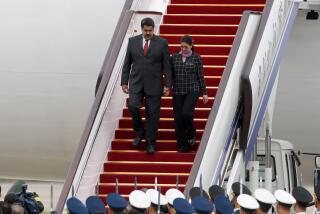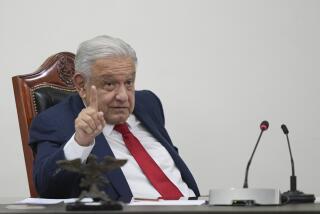U.S., Venezuela to restore full diplomatic ties
In a potentially significant step toward repairing their tattered relationship, the United States and Venezuela have formally agreed to resume full diplomatic relations, the State Department announced Thursday.
Department spokesman Ian Kelly said the two nations exchanged notes that in effect formalized pledges that President Obama and Venezuelan President Hugo Chavez made at the Summit of the Americas in April to reinstall ambassadors who were expelled in September.
U.S. Ambassador Patrick Duddy and his Venezuelan counterpart, Bernardo Alvarez, soon will resume their former posts in Caracas and Washington, respectively, Kelly said. Each country’s embassy had remained open and formal relations were never fully cut.
Kelly said the move would “help advance U.S. interests” by improving communication with the Venezuelan government and citizens.
The restoration of full ties came a day after the State Department said it was sending an ambassador back to Syria. The Bush administration recalled Ambassador Margaret Scobey in 2005 after the assassination of former Lebanese Prime Minister Rafik Hariri, who was killed by a car bomb in Beirut. There were widespread suspicions of Syrian involvement in the attack.
Analysts said the resumption of full diplomatic relations with Venezuela reflects the important commercial ties between the nations, the Obama administration’s desire for better Latin American relations and Chavez’s need to improve his image.
The two countries expelled each other’s ambassadors in a diplomatic spat. Chavez moved first, saying he was acting in solidarity with Bolivian President Evo Morales, who had expelled the U.S. ambassador there. Morales said the U.S. was plotting his downfall.
The U.S. soon followed suit, expelling Alvarez and shortly thereafter freezing the assets of three close aides of Chavez, saying they had “armed, abetted and funded” Colombia’s largest leftist rebel group, the Revolutionary Armed Forces of Colombia, or FARC.
The charges, coupled with the State Department’s “decertification” of Venezuela’s efforts in combating drugs, have stung Chavez, Caracas-based political analyst Ricardo Sucre said.
“These kinds of allegations have far-reaching effects on Chavez’s image abroad and his ability to carry out foreign policy,” Sucre said. “He hopes that with this resumption of full diplomatic relations, which is really a minimal gesture on his part, he can avoid the larger problems.”
During the Bush administration, relations between the two nations were abysmal, with leaders on both sides routinely exchanging insults. But relations seemed to improve at the April summit, where Obama and Chavez exchanged friendly greetings and Chavez presented Obama with a book.
Since taking office, Obama has said he wants “a new beginning” with Latin countries and has pledged to alleviate suspicions and work cooperatively with nations in the region.
Besides taking a friendlier attitude toward Chavez, Obama has eased travel and remittance restrictions on Cuba and promised Brazil that the U.S. would reduce or eliminate tariffs on imports of biofuels. He has also backed away from his strong rhetoric against free trade during last year’s presidential campaign, saying he now favors bilateral deals with Panama and Colombia.
Venezuela is the third-largest supplier of crude oil to the United States after Canada and Mexico. U.S.-Venezuelan trade totaled $5 billion last year, most of it Venezuelan oil exports.
--
Kraul is a special correspondent.
More to Read
Sign up for Essential California
The most important California stories and recommendations in your inbox every morning.
You may occasionally receive promotional content from the Los Angeles Times.











